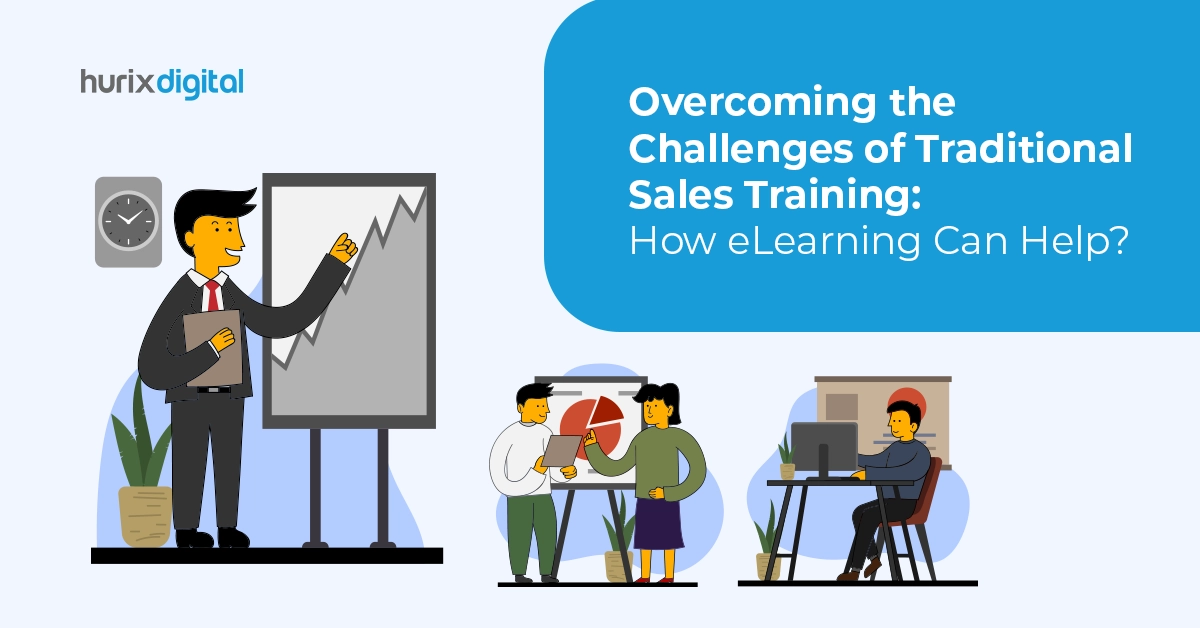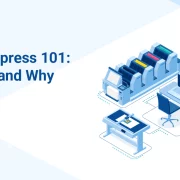
Overcoming the Challenges of Traditional Sales Training: How eLearning Can Help?
Summary
Discover how eLearning can address challenges in traditional sales training. This article highlights the benefits of online training for enhancing sales skills and performance.
Sales is an integral part of any company looking to earn revenues and accrue a profit. For a company, its sales team is the portal between its products and services and its customer base. The success of a company is heavily dependent on its sales force. As a result, sales training is an essential contributor to the company’s success.
About 72% of company revenue comes from existing customers, with 28% coming from new customers. This means your sales team is directly responsible for holding down the fort for you during good times and bad. Over 76% of companies report a 6% to 20% increase in sales after implementing sales techniques and enablement initiatives.
However, traditional corporate training is no longer feasible in today’s environment. Sales staff are now spread across time zones and work from all over the globe. This is where eLearning can help you generate more revenue while at it. To understand how let us look at the challenges faced by additional sales training methods and how eLearning can help mitigate them.
Table of Contents:
- Challenges of Traditional Sales Training
- How eLearning Can Help
- eLearning: The Sales Training Superhero
Challenges of Traditional Sales Training
Traditional sales training methods have been employed by organizations over the years with great success. They have been altered and adopted as the business landscape has evolved. However, over the past decade, things have moved much too rapidly.
As such, traditional sales performance improvement programs now face multiple challenges:
- Expense: Traditional sales productivity improvement courses are expensive. They are conducted in person, which includes travel and other logistics. Today, this approach no longer makes sense.
- Time-Consuming: As physical presence is a requirement, hours must be dedicated to training, which means the sales force is away from the job for prolonged hours. To avoid this, the programs are often rushed, leading to poor retention.
- Rigid Structure: Traditional sales effectiveness improvement programs have a rigid curriculum. It does not consider the diverse needs, roles, and geographic predicaments of individual employees, often rendering them largely ineffective.
- Limited Opportunities: These programs do not allow people to revisit any doubts they may have, and there is limited opportunity to test out their newly acquired knowledge.
Overall, traditional sales training has many drawbacks, which get further magnified in today’s fast-changing world. eLearning can provide solutions to it all.
Also Read: Adapting Workforce L&D Programs to the Virtual and Hybrid Landscapes
How eLearning Can Help
eLearning not only helps mitigate the challenges in traditional sales training that we have so far discussed, but it brings additional perks to the table as well.
1. Accessibility
eLearning comes with the option of remote training. This means the eLearning modules can be accessed 24×7 by salespeople from any location across the globe. This allows for much more flexibility.
2. Cost-effective
eLearning courses, once formulated, can be used multiple times. Furthermore, it eliminated the need to hire trainers every time, saving on travel expenses and logistics costs.
3. Scalability
Unlike traditional performance development courses, eLearning modules can be updated at any time with the latest requirements and updated data. The same course can be accessed by any number of employees as need be.
4. Consistency
Traditional training can vary in quality and content depending on the trainer. eLearning can provide consistent quality every time.
5. Customization
Unlike traditional courses, eLearning does not force individuals to learn in a predetermined manner and timeline. It allows for personalized learning paths and self-paced learning, which can lead to better knowledge retention.
6. Interactive Learning
eLearning can provide quizzes, exercises, simulations, and other virtual training tools to ensure even better knowledge retention and allow individuals to put their newly acquired knowledge into practice.
7. Real-time Feedback
eLearning platforms often include quizzes and assessments that provide instant feedback. This allows learners to immediately see where they need improvement, reinforcing their understanding of the material.
8. Tracking Progress
eLearning platforms often include progress-tracking features. This not only allows managers to monitor their team’s progress but also allows them to extend a helping hand to anyone who might be falling behind.
9. Collaborative Learning
Many eLearning platforms include features such as discussion forums and group projects, allowing individuals to learn from each other and share knowledge and experiences. This can also lead to improved teamwork.
10. Reduced Time
As there is no time wasted on travel, waiting for others, or covering content that one may already know, eLearning considerably shortens the time one spends on the same coursework as compared to traditional sales training. Salespeople find it easier to keep focusing on their jobs while completing training at their own pace.
11. Continuous Learning
eLearning ensures that the coursework is always up-to-date with current business practices. It gives salespeople access to the latest data. Furthermore, they can go back to the course at any time if they need to take another look at it and its components.
12. Mobile Learning
Salespeople are often on the move. eLearning courses can be accessed on mobile devices, allowing sales staff to learn whenever and wherever it’s convenient for them.
13. Global Reach
eLearning is especially ideal for multinational companies with sales teams spread across the globe and for new-age companies that have remote staffing.
14. Environmentally Friendly
And that’s not all. eLearning is also a more sustainable option as it reduces the need for physical materials and travel, leading to a lower carbon footprint.
Also Read: How Flexible Staffing Future-Proofs Your Workforce Planning?
eLearning: The Sales Training Superhero
Sales training remains crucial for a company’s success. Clearly, the traditional methods of corporate training now need an upgrade. eLearning mitigates the many challenges faced by traditional sales effectiveness improvement programs and has an incredible return on investment.
However, unless you have access to effective training content, the results may not be remotely positive. A reliable name in the eLearning business is Hurix Digital. They have everything you need to ensure your sales team’s professional development needs are met.
Hurix Digital leverages the power of artificial intelligence to create personalized eLearning content for your training needs. Their courses follow adaptive learning techniques, ensuring no individual is left behind. The course material was designed with practical application in mind, making it the perfect fit for a client-facing field such as sales.
If you want to invest in sales training for your organization, call Hurix Digital today and watch the revenue numbers fly!

Performance, Results, Growth, and Life-Long Learning define my professional life. I am passionate about making workplace learning planful, purposeful, and impactful. I take pride in partnering with clients and bringing them the best in learning design and creating solutions that address business challenges.







